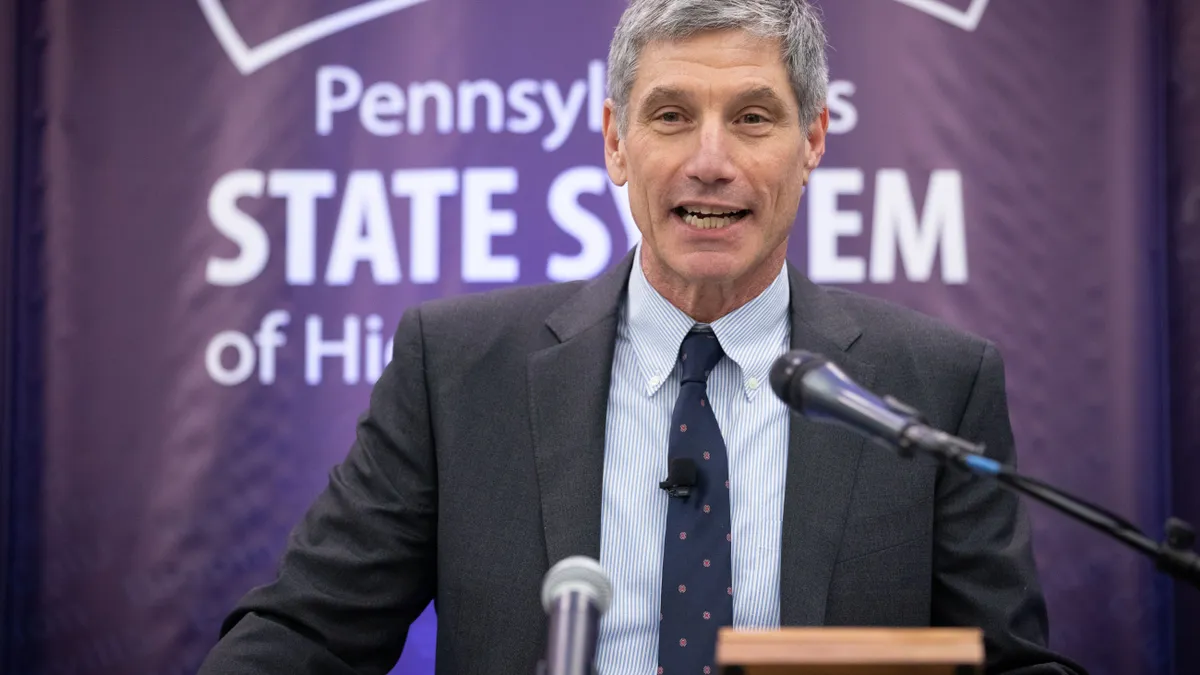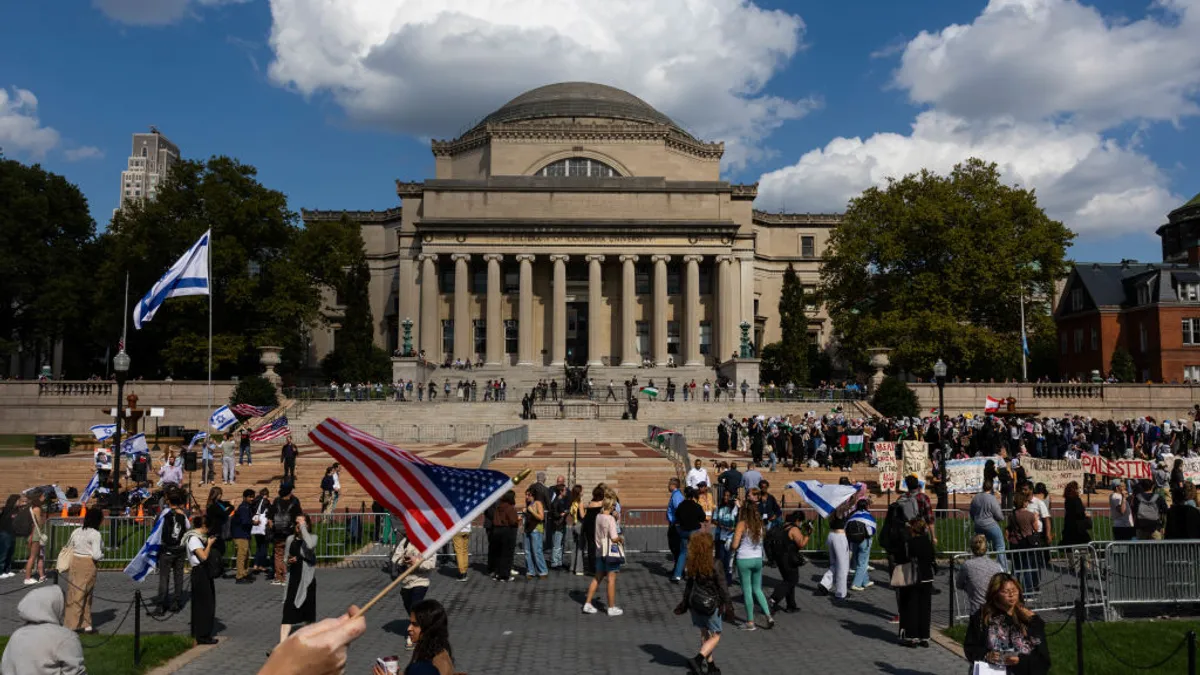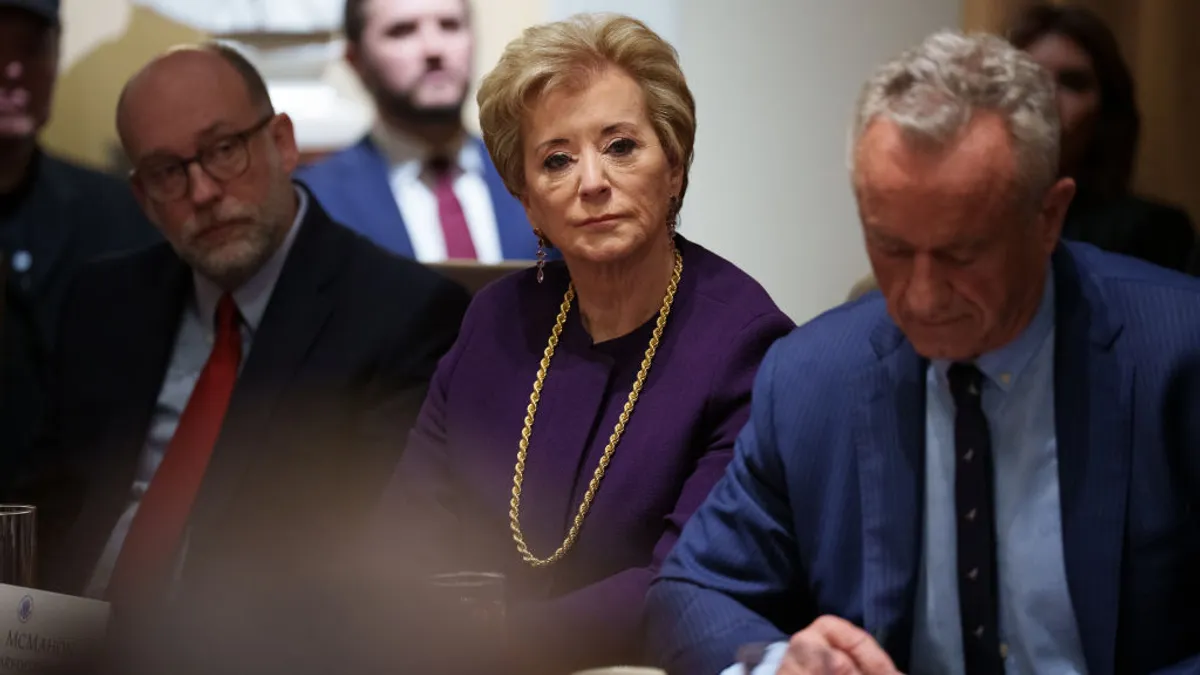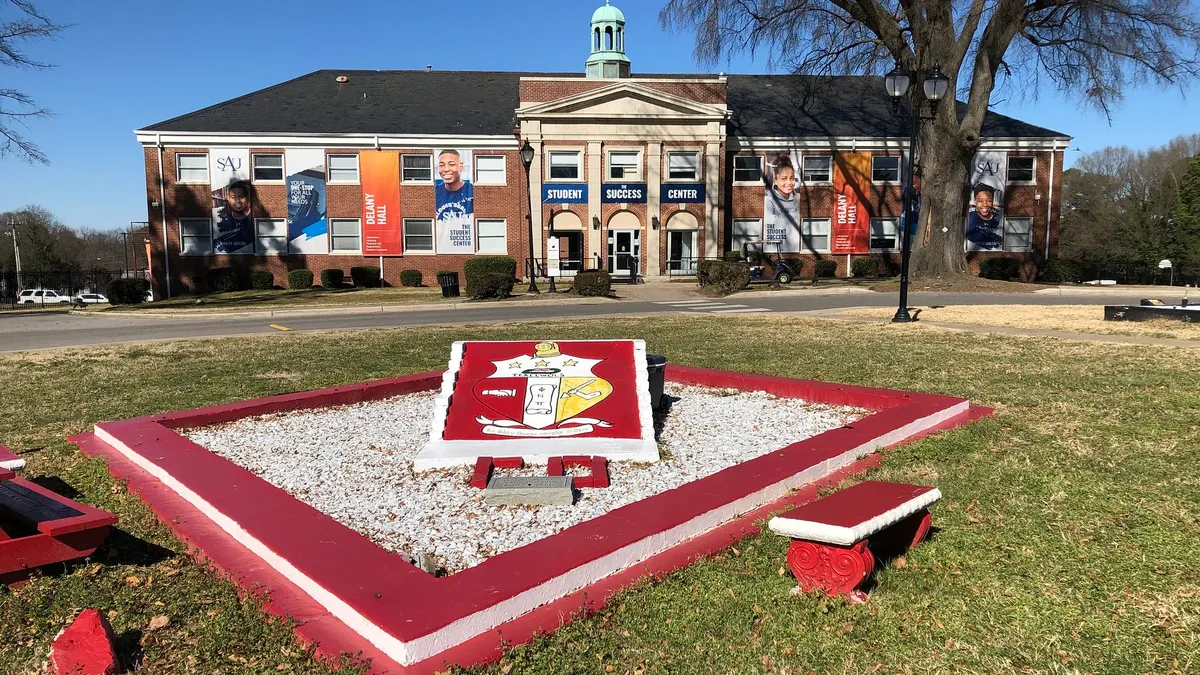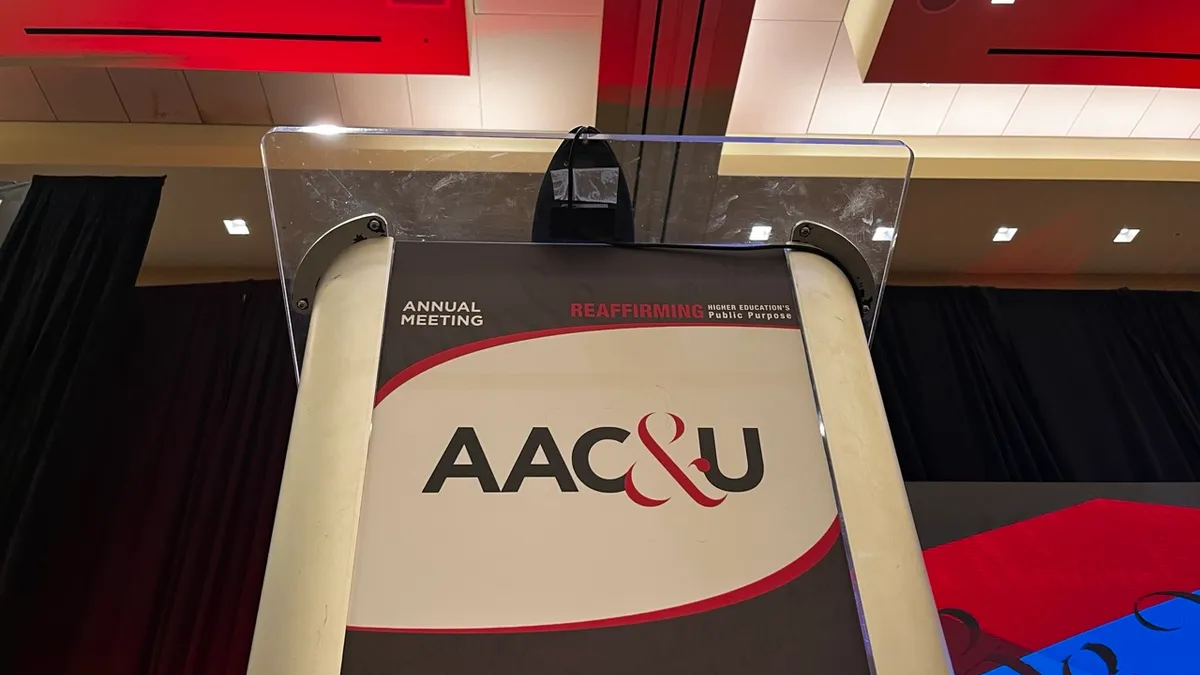Around the Independence Day weekend, Dan Greenstein, the chancellor of the Pennsylvania State System of Higher Education, spent a few days reading and dissecting public comments on its proposal to consolidate six institutions into two.
A historian turned postsecondary policy guru, Greenstein hadn't done such qualitative research for a long time. But the system was nearing a final vote with its Board of Governors to greenlight a vision he was aggressively promoting, one that would forever alter PASSHE's course.
Backlash to the plan had been torrential. "The universities have already been stripped of just about everything they were and are already a shell. Now you are taking the very last thing they have, their identity, and getting rid of that as well," one detractor wrote to the system. "Please do not ruin these great institutions," another wrote.
A few were supportive, because they believed it would help right the system's shaky finances and create new, innovative programming options.
When Greenstein spoke to the governing board at a meeting in July, it was his final pitch for the plan. The system is bleeding cash, and delaying further would cost it $40 million to $50 million a year, he said.
Many of the PASSHE universities had slipped toward insolvency. The few institutions that held steady enrollments subsidized the others, a model Greenstein has said he considers financially unviable. The enrollment drop was partially attributable to Pennsylvania's saturated higher education market. But weak state investment also drove up tuition and fee prices, boxing out those students PASSHE was designed to serve and causing its enrollment to plummet about 20% over the last decade or so. Greenstein points to the rising costs as the main culprit of the enrollment dip.
He helped devise the merger, which will pull together Bloomsburg, Lock Haven and Mansfield universities in the northeast to create a combined institution that will emphasize stackable credentials and in-demand fields in the state. California, Clarion and Edinboro universities in the west will form an institution concentrating on online education.
The governors unanimously approved the proposal on July 14. The first student cohort would enroll in the new institutions in August 2022. But in interviews with Higher Ed Dive, Greenstein and others within the system presented that vote as the start of the process, not the conclusion.
Some instructors doubt such a feat can be accomplished on the system's timeline. Much of the work revamping the institutions is just starting, and the coronavirus is preoccupying faculty energies.
It's also not yet clear how much capital — political and emotional — the merger process has sapped from Greenstein. Bruised feelings linger among important constituencies, as students, faculty and alumni met the plan with bitter criticism. Other higher ed leaders have left their posts after such clashes.
"Morale on campuses is truly at an all-time low," said Jamie Martin, president of the Association of Pennsylvania State College and University Faculties, the faculty union for the system.
A reconceived PASSHE
Greenstein's plan for bolstering PASSHE is familiar for contemporary higher ed: it involves truncating the degree timeline and identifying untapped contingents of students — adult learners, those who haven't finished a credential, or students who want short-term programs.
It will be challenging for highly traditional institutions to adopt those strategies. An enormous undertaking is beginning, including a reworking of the collective bargaining agreement that references 14 universities instead of 10, crafting curricula and academic requirements, designing departments, and selecting faculty and administrative leaders. The system is also mapping out admissions policies for all its institutions, including one that guarantees entrance to its universities to those with an associate degree from a Pennsylvania community college. It offers transfer into a parallel program with junior standing.
This month, the governing board approved several new deals with the faculty union. One establishes an interim curriculum committee for each of the new institutions. The committees will develop policies and procedures for making changes to curricula. Another agreement preserves faculty jobs for the next three years as long as policymakers deliver on a $200 million promised investment in the system over several years.
The mergers' effects on jobs had been somewhat murky. PASSHE laid off 31 faculty members at the end of the 2020-21 year, though the system billed this as part of a larger restructuring rather than a consequence of consolidation. The faculty union worked to find alternatives to layoffs, and continues to, a spokesperson for the organization said.
"Morale on campuses is truly at an all-time low."

Jamie Martin
President of the Association of Pennsylvania State College and University Faculties
Parts of the plan, however, are incomplete.
The system's accreditor has yet to sign off on it, though PASSHE is moving forward in the process. The NCAA hasn't said whether the system can preserve athletics teams on all six combined campuses.
At recruitment events, faculty can't answer some questions from prospective students because of these holes, Martin said.
Sam Claster, a professor and chair of Edinboro's sociology department, questioned whether the system could successfully execute "real-life pragmatics" of the mergers. Some of the universities are more than 60 miles to 70 miles apart, creating a question of whether it's practical for them to coordinate so closely.
The proposal calls for a singular president and leadership slate at each integrated institution. But attempts elsewhere for one college president to monitor multiple campuses have often failed.
Claster also gave the example of a student who needed to meet immediately with a department chair based at a different institution.
A lack of such easily available supports clashes with PASSHE's access mission, Claster said, worrying about the consequences for disadvantaged students.
Greenstein in his interview acknowledged some of the challenges but responded to several of the concerns. Students won't have to travel between campuses for their studies, he said. The combined universities will expose students to a greater breadth of academic offerings. And getting athletics right is particularly important for PASSHE's rural institutions because they help boost student mobility, Greenstein said.
Broadly, though, the mergers and grander system redesign haven't rectified a lack of "systemness" among PASSHE institutions, Claster said. The campuses operate with a high degree of independence but would benefit from system guidance, he said. This is evident from their coronavirus safety protocols.
"It's good that we have freedom to make our own policies," Claster said. "But I would have liked to see the state system lobby and push harder: for example, a vaccine mandate for all of the schools."
Building relationships
Greenstein argues the system doesn't have legislative authority to require a vaccine, a position that has generated some skepticism among campus officials. Taken into the larger picture, though, avoiding a fight with lawmakers would make sense.
Observers have called for Greenstein to press the state leaders for more money, and in lieu of consolidation.
Pennsylvania higher ed is notoriously underfunded, ranking among the lowest in the U.S. in appropriations per full-time equivalent student, according to the State Higher Education Executive Officers Association. The decline largely can be traced to aggressive postsecondary spending cuts enacted by former Gov. Tom Corbett, a Republican who took office in 2011.
Greenstein has spoken publicly about rebuilding a relationship with the legislature and said that not taking action on the mergers would jeopardize future legislative support. In his interview, Greenstein pointed to the state's $200 million commitment as proof that he's worked to secure PASSHE more funding.
When he took over as chancellor, state officials didn't trust the system, particularly over student outcomes and the finances of low-enrollment schools like Mansfield and Cheyney universities, Greenstein said. Cheyney, the oldest historically Black college in the country, at one point owed more than $40 million to PASSHE — about $10 million more than Cheyney's entire annual budget. Most of that debt was forgiven earlier last year after the college met certain benchmarks, such as balancing its budget for three consecutive years.
"I think we have been doing the hard work" to restore policymakers' confidence, Greenstein said. "I'm hoping we'll see that in a further strengthened partnership."
Departing higher ed leaders
Faculty's relationship with Greenstein appears more tenuous. He did not endear their goodwill as the system mapped out changes. The draft mergers spurred accusations the administration wasn't transparent. The documents detailing the mergers numbered hundreds of pages and were loaded with information and phrasing even those versed in higher ed policy found difficult to parse.
The board hired Greenstein about three years ago from his post in the postsecondary wing of the Bill & Melinda Gates Foundation. He was charged with overhauling a system bedeviled by problems hitting PASSHE — ones that many public higher ed institutions share, including waning enrollment, financial difficulties and a historically rocky relationship with state government.
But higher ed leaders brought in with similar change mandates haven't survived making tough or unpopular calls, either by design or because they couldn't contend with persisting bitterness within their communities.
Jeb Spaulding, former chancellor of the Vermont State Colleges System, resigned abruptly last year amid backlash over his recommendation to close three campuses in the wake of the pandemic's financial turmoil.
Ithaca College's president, Shirley Collado, announced earlier this year she was leaving to lead College Track, an organization that helps support low-income and first-generation high school and college students. The move came after the private nonprofit institution moved to cut 116 of nearly 550 full-time equivalent faculty positions.
"We did commit to an inclusive process, and an organic one."

Dan Greenstein
Chancellor of the Pennsylvania State System of Higher Education
Without the faith of the faculty, Greenstein is in somewhat of a tricky spot, said Andrew Koricich, a higher ed professor at Appalachian State University who has researched PASSHE extensively.
But his position differs from presidents who were forced out because he has the backing of the governing board and, to a degree, the legislature — those who control the purse strings, Koricich said.
"In a lot of ways, that's the support that matters most," Koricich said.
Greenstein's job security could be threatened if the mergers don't yield results in a couple of years, he said. But PASSHE has floundered for years, and Greenstein made changes within the system, efforts the relevant authorities appreciate. An analysis of the mergers conducted by Baker Tilly, a consulting firm that worked on the PASSHE merger, concluded they would slightly benefit the state economy more than would keeping the institutions separate.
Greenstein said he wasn't surprised at the extent of the blowback, as brainstorming for the mergers yielded "an enormous amount of zeal and passion."
"We did commit to an inclusive process, and an organic one," he said.
Higher ed is nuanced, and explaining the complexities of a maneuver like consolidations is even more difficult, said Christine Smith, managing director in the higher ed and risk advisory practice for Baker Tilly. Being as straightforward as possible as to why an institution is pursuing a merger and its benefits is the best approach, she said.
PASSHE has a response to other criticisms, too. High-ranking administrators will be on the merging institutions' campuses to participate in community outreach and speak to constituents face to face if the president is elsewhere, Smith said. Exact organizational structures are still being worked out, she said, but officials planning the mergers prioritized creating a new "leadership culture."
The work is ongoing. Greenstein doesn't sound interested in leaving before it progresses further.
Pennsylvania, he said, has a "high level of recognition" of the importance of educational pipelines and their economical benefits. There's a "richness in the dialogue" that even extends to the General Assembly, which in Greenstein's opinion is rare.
"That movie to me seems worth sticking around to watch," he said.



